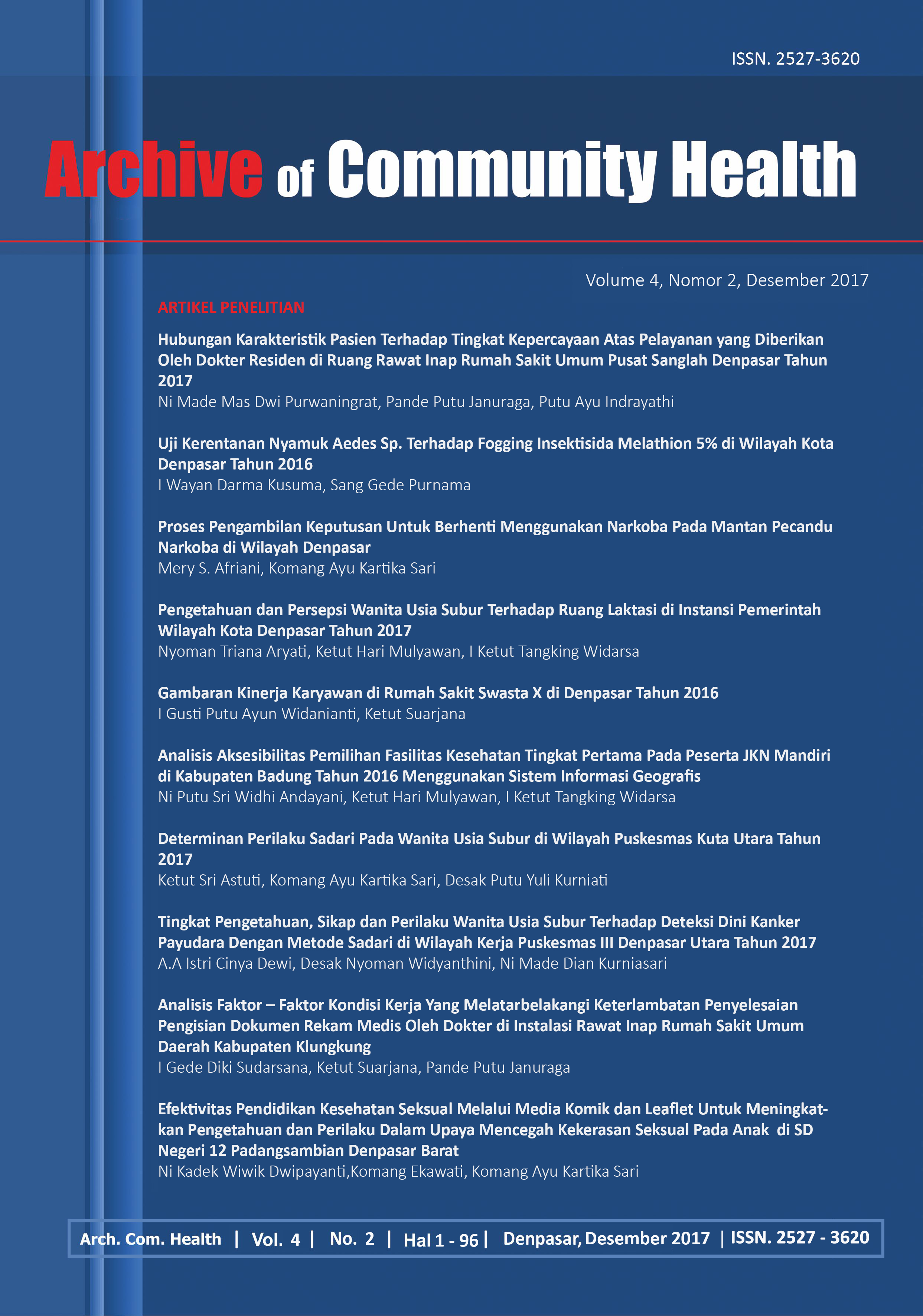GAMBARAN KINERJA KARYAWAN DI RUMAH SAKIT SWASTA X DI DENPASAR TAHUN 2016
Abstract
ABSTRAK
Tujuan dari penelitian ini adalah untuk memahami kinerja karyawan di salah satu rumah sakit swasta pada tahun 2016. Penelitian ini adalah penelitian kuantitatif deskriptif dengan desain cross sectional. Teknik pengambilan sampel menggunakan random sampling (probability sampling), dengan menggunakan teknik proportional stratified random sampling dengan jumlah sampel 86 orang. Data dianalisis dengan analisis bivariat menggunakan chi-square dengan ? = 0,05. Hasil penelitian ini mengungkap sekitar 51,16% (44 orang) memiliki kualitas kerja minor dari 86 responden. Responden dengan kualitas kerja yang baik adalah 51,16% (44 orang). Efektivitas minor responden adalah 65,12% (56 orang). 51,16% (44 orang) memiliki kebiasaan tepat waktu yang buruk, dan responden dengan independensi rendah adalah 62,79% (54 orang). Perbedaan proporsi hasil yang bermakna secara statistik status pekerjaan responden dengan kualitas karyawan adalah (p = 0,013). Ada perbedaan proporsi yang bermakna secara statistik antara latar belakang pendidikan responden dan efektivitas (p = 0,044), hasil uji analisis dalam proporsi yang berbeda antara latar belakang pendidikan responden dan tepat waktu adalah (p = 0,10). Hasil analisis uji coba pada proporsi umur responden yang berbeda dengan independensi kerja adalah (p = 0,047). Kesimpulan dari penelitian ini adalah setiap hasil penelitian ini terhadap kinerja sub-variabel, ini menunjukkan total dari hasil kinerja karyawan secara umum, yaitu 52,33% (45 orang) dari 86 responden yang berarti kinerja karyawan dapat dikategorikan baik. Beberapa saran yang disarankan dalam penelitian ini, mereka meningkatkan kualitas kerja dan menggunakan teknologi, dana, dan semua peralatan di rumah sakit diperlukan untuk menyelesaikan pekerjaan.
Kata Kunci : Performa, karyawan, rumah sakit
ABSTRACT
The purpose of this research is to understand the employees’ performance at private hospital in 2016. This research is a descriptive quantitative studies with cross sectional design. The sampling technique used random sampling (probability sampling), by using proportionate stratified random sampling technique with 86 persons as the samples. Data was analised with bivariate analysis using chi-square with ?=0.05. The result of this research reveal around 51.16% (44 persons) have a minor working quality out of 86 respondents. Respondents with good working quality are 51.16% (44 persons). The minor effectiveness of respondents is 65.12% (56 persons). 51.16% (44 persons) have a bad punctual habit, and respondents with low independence are 62.79% (54 persons). The different valuable proportion result statistically employment status of respondents with employees quality is (p=0.013). There is difference valuable proportion statistically between the education background of respondents and effectiveness in (p=0.044), the result of analysis trial in different proportion between education background of respondents and punctual is (p=0.10). And the result of trial analysis in different proportion of age of the respondents with working independence is (p=0.047) The conclusion of this research is every results of this research towards sub-variable performance, it shows the total from employees performance result generally, which is 52.33% (45persons) from 86 respondents that means the employees performance can be categorized as good. Some advices are suggested in this study, they are improving the quality of work and using the technology, funding, and all of the equipments in the hospital are needed to finisih a job.
Keywords: performance; employee; private hospital














